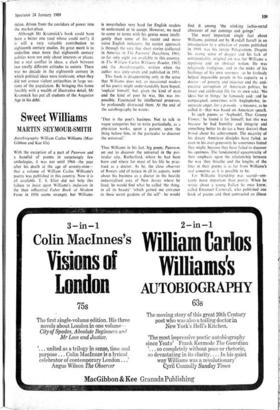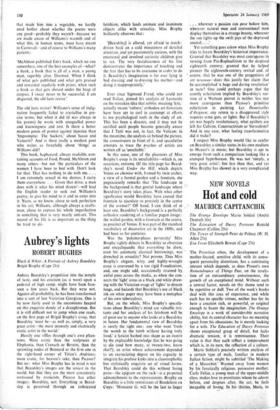Sweet Williams
MARTIN SEYMOUR-SMITH
With the exception of a part of Paterson and a handful of poems in surprisingly few anthologies, it was not until 1964—the year after his death at the age of seventy-nine— that a volume of William Carlos Williams's poetry was published in this country. Now it is all available. T. S. Eliot did not help (his failure to insist upon Williams's inclusion in the then influential Faber Book of Modern Verse in 1936 seems strange); but Williams
is nevertheless very hard for English readers to understand or to accept. However, we need to come to terms with his genius more intelli- gently than some of his recent and more naive English imitators; the easiest approach is through the very fine short stories (collected in America in The Farmers' Daughters, 1961; so far only eight are available in this country, in The William Carlos Williams Reader, 1967) and the Autobiography, written when the author was sixty-seven and published in 1951.
This book is disappointing only in the sense that Williams does not, as occasional readers of his poetry might understandably have hoped, 'explain' himself; but, given the kind of man and the kind of poet he was, this was im- possible. Fascinated by intellectual processes, he profoundly distrusted them. At the end of the autobiography he wrote: 'That is the poet's business. Not to talk in vague categories but to write particularly, as a physician works, upon a patient, upon the thing before him, in the particular to discover the universal.'
Thus Williams in his last, big poem, Paterson, set out to discover the universal in the par- ticular city, Rutherford, where he had been born and where for most of his life he prac- tised as a doctor. As he, the close observer of flowers and of nature in all its aspects, went about his business as a doctor in the heavily industrialised area of New Jersey where he lived, he would find what he called 'the thing, in all its beauty' which gained me entrance to these secret gardens of the self'—he would
find it among 'the stinking ischio-rectal abscesses of our comings and goings.' The most'. important single fact about Williams, pointed out by Randall Jarrell in an introduction to a select-ion of poems published in 1949, was his innate Pelagianism. Despite his strong sense of disgust and his lack of sentimentality, original sin was for Williams a repulsive and an abstract notion. He was religiously irreligious, and in the midst of his loathings of his own sourness—as he tirelessly helped impossible people in his capacity as a doctor—of poverty and injustice and the anti- creative corruption of American politics, he loved and celebrated life for its own sake. 'No ideas but in things.' he famously said; and he campaigned, sometimes with Anglophobic, in- accurate anger, for a prosody--a measure, as he called it—that was based on American speech.
In such poems as 'Asphodel, That Greeny Flower,' he found it for himself; but this was because he had humility and integrity and something better to do (as a busy doctor) than brood about his achievement. The majority of his dreary American disciples have failed, as even in his over-generosity he sometimes hinted they might, because they have failed to discover his openness. The fundamental egocentricity of their emphasis upon the relationship between the way they breathe and the lengths of the lines in their poems is as far from Williams's real concerns as it is possible to be.
For Williams friendship was sacred—cer- tainly more important than poetry. When be writes about a young Italian he once knew, called Emanuel Carnevali, who published one book of poems and then contracted an illness
that made him into a vegetable, we hardly need bother about whether the poems were any good—probably they weren't—because we are made aware of Williams's warmth and of what this, in human terms, must have meant to Carnevali—and of course to Williams's many patients: `McAlmon published Em's book, which no one remembers, one of the best examples of—what? a book, a book that is all of a man, a young man, superbly alive. Doomed. When I think of what gets published and what gets praised and rewarded regularly with prizes, when such a book as that gets shoved under the heap of corpses, I swear never to be successful, I am disgusted, the old lusts revive.'
The old lusts revive! Williams's sense of indig- nation frequently failed to crystallise in pre- cise terms; but when it did (it was always in his poems) he wrote with unequalled power and knowingness and zest. Is there a better modern poem of protest against injustice than 'Impromptu: The Suckers,' about Sacco and Vanzetti? And is there really a modern poet who writes as forcefully about 'things' as Williams did?
This book, haphazard, always readable, con- taining accounts of Ford, Pound, McAlmon and many others—but not 'the particulars of the women I have been to bed with. Don't look for that. That has nothing to do with me. . . . I am extremely sexual in my desires; 1 carry them everywhere. . . . Given that drive, a man does with it what his mind directs'—will lead the English reader to seek out Williams's poetry, to give his mind to it and to enter into it. Yeats, as we know, chose to seek perfection in his art; Williams, although always a crafts- man, chose to express his whole imperfection in something that is very nearly anti-art. This record of his life is as important as the thing he tried to do.



































 Previous page
Previous page